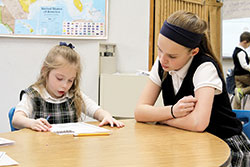Students give up recess during Lent to help others

Sixth-grader Chloe Griffin, right, works with first-grader Avery Pierce at St. Gabriel School in Connersville. The school’s sixth-grade students are giving up their recess during Lent to help other students. (Submitted photo)
By John Shaughnessy
If you were a grade-school student, what would be the one part of the school day that you would hate to give up?
Now consider the sacrifice that the sixth-grade students at St. Gabriel School in Connersville have made this Lent—a sacrifice that stunned Father Dustin Boehm, the students’ pastor and a frequent visitor to the parish school.
Father Boehm immediately noticed something unusual when he stopped by the cafeteria during one of the first days of Lent.
It was right near the end of the lunch period for the sixth-grade students, a time when the class normally couldn’t wait for that carefree, joyful time that most children treasure—recess.
“So I asked a parent volunteer about where they are,” Father Boehm recalls. “She told me that the sixth-grade students were in the lower grade-level classrooms, helping out. The parent proceeded to tell me that this is what the sixth grade decided to do for Lent, namely that they had given up their recess time to help out.”
Stunned, the priest considered the sacrifice involved for a grade-school student to give up recess, every day, during Lent.
“When we were in grade school, recess was perhaps the most important part of our school day,” says Father Boehm, who also is the pastor of St. Bridget of Ireland Parish in Liberty. “It was ‘me’ time, to do what I wanted—within the rules, of course. We got to play or read or talk with friends. But we didn’t have to work. Because of that, it was very important to us. And that is what makes this such an incredible sacrifice.”
The seeds of this sacrifice were planted a few weeks before Lent when sixth-grade teacher Angela Fuller mentioned the possibility of giving up recess once a week to help children in the lower grades. Yet when Lent started, and there was no plan in place, sixth-graders Chloe Griffin and Lydia Powell decided to make one.
After giving up recess for the first Friday of Lent to help younger children, the two girls decided to give it up every day during Lent. Nearly all of the other 16 students in the sixth grade soon chose to follow the plan.
“It feels nice that we are doing this together,” Chloe says about her classmates, who are the oldest students in the school. “It’s brought most of us closer.”
The sixth-graders help the kindergarten children as they color pages, read books to the first-graders and help where they can with the second- and third-graders.
“The younger children love us,” Chloe says. “They run up to us and say ‘hi,’ and give us hugs. And the teachers all enjoy having us in the classrooms.”
Their teacher is excited, too.
“They’re exceptional role models for the younger students, who look up to them,” Fuller says. “They’re very committed to their faith. They enjoy learning about it, and they ask very good questions about it.”
For Fuller, her students’ sacrifice reflects the acronym—JOY—that has guided the class this year.
“J is for ‘Jesus’ first, then O is for ‘others,’ and then Y for ‘yourself,’ ” Fuller says. “It’s important to give them opportunities to practice that.”
Similar to most Lenten sacrifices, this one has its challenges.
“Sometimes, it’s really hard,” Lydia says. “It’s going to get a lot warmer and nicer outside, and we’re going to see the fourth- and fifth-graders outside while we’re helping. But we feel we’ll inspire them to help others.”
Father Boehm says there is another important point to make about the students giving up recess for Lent. It has to do with the fact that the students never told him about their sacrifice, even though he interacts with them regularly.
“I never would have known about this Lenten activity had it not been for the parent in the cafeteria,” he says. “This tells me that the class is not interested in recognition. But after having spoken with them, I believe that they see that what they are doing is special and different.
“And perhaps it will inspire some of us more seasoned Catholics throughout the rest of our Lenten season.” †
